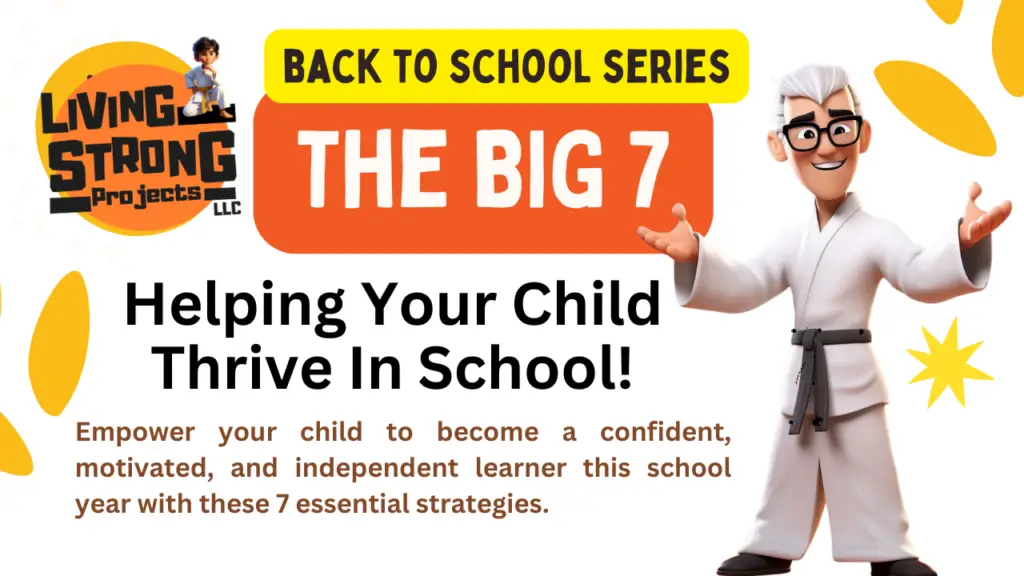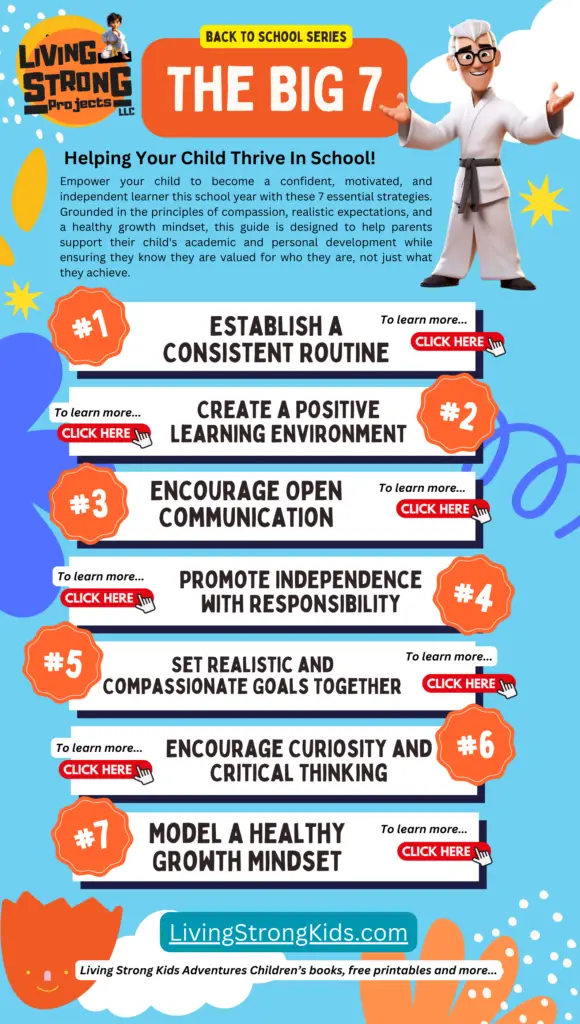Helping Your Child Thrive in School: The BIG 7 Empowering Ideas for Parents
As the new school year approaches, many parents are preparing to support their children’s success. At Living Strong Kids Adventures, we believe that empowering our children is about more than just academic achievement. It’s about helping them grow into confident, motivated, and independent learners who know they matter, regardless of their grades or outcomes.
Incorporating insights from the book Never Enough, we’ve created “The BIG 7” empowering ideas for parents. These tips are designed to help you foster a positive, supportive environment where your child can thrive without feeling pressured to meet unrealistic expectations.

1. Establish a Consistent Routine
Consistency provides a sense of security and stability, which are crucial for your child’s well-being. Establish regular times for waking up, homework, meals, and bedtime, but be flexible when needed. The goal is to create a supportive environment that allows your child to thrive without feeling pressured. Routine helps build good habits, but it’s important to remember that flexibility is key. A missed bedtime or a late homework session won’t derail your child’s progress—it’s all part of learning to adapt and manage life’s demands.
2. Create a Positive Learning Environment
Designate a quiet, well-lit space for study, free from distractions. This space should be a haven where your child feels comfortable and valued, reinforcing the idea that learning is important but doesn’t define their worth. Encourage your child to take ownership of this space, making it a place they want to spend time in. This could include personal touches like favorite books or inspiring quotes, but always with the understanding that the environment supports learning, not pressure.
3. Encourage Open Communication
Foster an environment where your child feels safe to share their experiences, challenges, and successes. Practice active listening and avoid jumping to solutions. Instead, validate their feelings and remind them that they matter, regardless of the outcomes they achieve. Open communication is key to understanding your child’s needs and concerns, and it helps build trust and resilience as they navigate the ups and downs of school life.
4. Promote Independence with Responsibility
Give your child age-appropriate responsibilities, like organizing their school supplies or setting up their study space, but do so with the understanding that their effort is what counts. Emphasize that taking responsibility is about learning and growth, not perfection. Encouraging independence teaches your child important life skills, but it’s crucial to celebrate the effort they put in, not just the end result. This approach helps them learn that they are capable and competent, building their confidence in their abilities.
5. Set Realistic and Compassionate Goals Together
Work with your child to set achievable academic and personal goals. Focus on the process, not just the end result. Celebrate effort, progress, and resilience rather than only outcomes. This approach helps avoid creating a toxic environment where children feel they have to constantly meet high expectations to be valued. Setting goals should be a collaborative process where your child feels heard and involved. This not only helps them stay motivated but also teaches them how to set and achieve goals throughout their lives.
6. Encourage Curiosity and Critical Thinking
Inspire your child to explore their interests, ask questions, and think critically, without attaching their worth to their performance. Encourage learning for the sake of learning and discovery, helping them understand that their curiosity and creativity are what make them unique and valuable. Cultivating curiosity ensures that your child sees learning as a lifelong adventure, not just something confined to the classroom.
7. Model a Healthy Growth Mindset
Teach your child that challenges are opportunities to grow, but also that it’s okay to fail and take breaks. Avoid creating a high-pressure environment by reinforcing that their value isn’t tied to their achievements. Emphasize that they matter simply because of who they are, not because of what they do. Modeling this mindset yourself—by showing how you handle setbacks and celebrate small wins—can have a powerful impact on how your child approaches their own challenges.
At Living Strong Kids Adventures, we’re committed to helping families empower their children in meaningful, lasting ways. By incorporating these “BIG 7” empowering ideas, you can help your child start the school year with confidence, knowing that they are supported, valued, and capable of great things. Remember, the most important lesson you can teach your child is that they matter, no matter what.
For more empowering tips and resources, explore our Back to School Series and join us in helping every child live strong!




